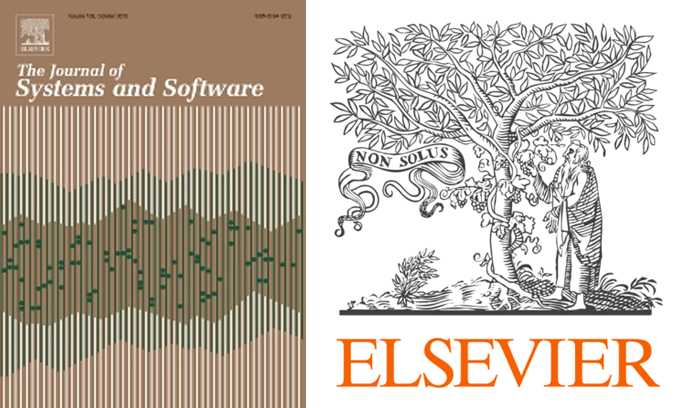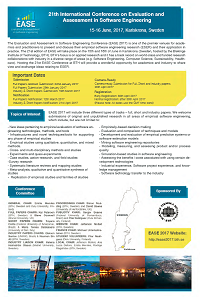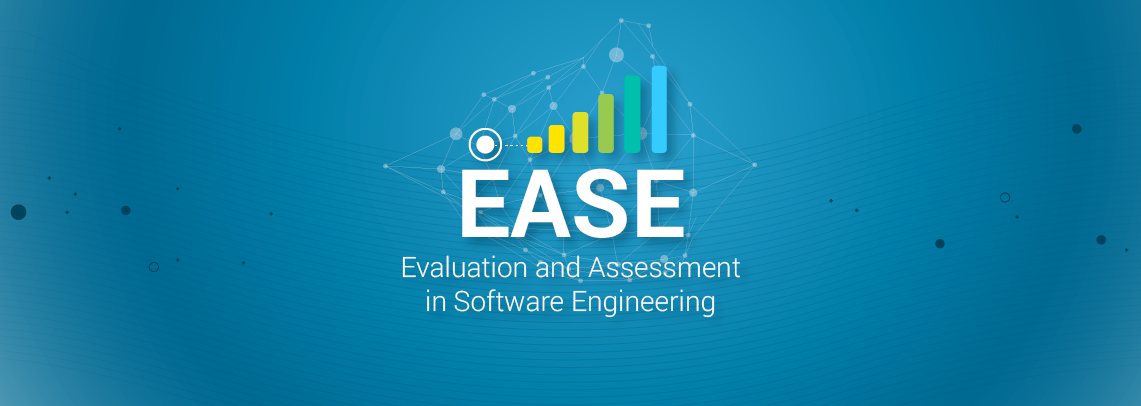21st International Conference on Evaluation and Assessment in Software Engineering
15– 16 June, 2017, Blekinge Institute of Technology, Karlskrona, Sweden

The best papers will be invited to submit an extended version to the Journal of Systems and Software

The International Conference on Evaluation and Assessment in Software Engineering (EASE) is one of the premier conferences to present research results related to empirical software engineering. EASE provides a stimulating forum where researchers and practitioners can present and discuss recent research results on a wide range of topics, in addition to also exchanging ideas, experiences and challenging problems.
The 21st edition of EASE will take place from the 15th to the 16th of June at the Blekinge Institute of Technology (BTH), in the city of Karlskrona, in Sweden. BTH focuses on applied research with strong industrial collaboration; it offers about 35 educational programmes in 12 departments at two campuses located in Karslrkona and Karlshamn, to around 6,600 students (part-time and full-time).
We are seeking the following types of submission:
- Full papers (max. 10 pages)
- Short papers (4 - 6 pages)
- Industry experience reports (max. 4 pages).
Submitted papers must be written in English, and must conform to the ACM Proceedings Format.
All papers must be submitted through the EasyChair submission system in PDF format.
All the accepted papers will be included in the proceedings published in the ACM International Conference Proceedings Series.
At least one author of each accepted paper must register by the camera-ready deadline.
We welcome submissions of original and unpublished research (as full, short and industry papers) in all areas of empirical software engineering, which include, but are not limited to:
- New ideas pertaining to empirical evaluation of software engineering technologies, methods, and tools, e.g., transferring and applying empirical methods from other disciplines to empirical software engineering
- Infrastructures and novel techniques/tools for supporting any phase of empirical studies
- Empirical studies using qualitative, quantitative, and mixed methods
- Cross- and multi-disciplinary methods and studies
- Experiments and quasi-experiments
- Case studies, action-research, and field studies
- Survey research
- Systematic literature reviews and mapping studies
- Meta-analysis, qualitative and quantitative synthesis of studies
- Replication of empirical studies and families of studies
- Empirically-based decision making
- Evaluation and comparison of techniques and models
- Development and evaluation of empirical prediction systems or software estimation models
- Mining software engineering repositories
- Modeling, measuring, and assessing product and/or process quality
- Simulation-based studies in software engineering
- Assessing the benefits / costs associated with using certain development technologies
- Industrial experience, Software project experience, and knowledge management
- Software technology transfer to the industry
Full Papers Track
High quality papers describing unpublished, original work are solicited on any software engineering topic, provided there is a substantial empirical dimension to the work being presented.
Papers are limited to 10 pages, must be written in English, and be formatted according to the ACM authoring guidelines. Papers which exceed 10 pages, are outside the scope of the conference, or do not follow the formatting guidelines will be rejected without review.
Important Information:
- Submissions that exceed the page limit (longer than 10 pages), or are outside the scope of the conference, or do not follow the formatting guidelines will be rejected without review.
- Full paper track submissions must be submitted through EasyChair submission system by choosing the “full paper track”
Full Papers Co-Chairs:
- Steve Counsell (Brunel University, UK)
- Kai Petersen (Blekinge Institute of Technology, Sweden)
Short Papers Track
This track provides an opportunity for researchers and practitioners to present their research, practical experience, or issues related to empirical software engineering. In particular, the goal of the track is to promote early-stage and ongoing work, research, practices, experiences, and issues that are not at a mature enough stage to be submitted as full papers.
Important Information:
- Submissions that exceed the page limit (longer than 6 pages), or are outside the scope of the conference, or do not follow the formatting guidelines will be rejected without review.
- Short paper track submissions must be submitted through EasyChair submission system by choosing the “short paper track”
Short Papers Co-Chairs:
- Maria Teresa Baldassare (University of Bari, Italy)
- Tayana Conte (Federal University of Amazonas, Brazil)
Industry Papers Track
The industry track at EASE 2017 in Karlskrona, plans to provide an opportunity for practitioners to share their experience in the area of empirical software engineering (ESE) with other practitioners and researchers. Broadly the track has the same research scope as the main conference.
In particular, we are interested in experience reports (both positive and negative) about adoption and evaluation of software engineering technologies (like tools, ideas, processes, practices and methods) in industrial settings. As a general guide the experience report should consist of the following:
- A description of the organizational settings
- Motivation for the use/evaluation of a technology
- A summary of the outcomes and the steps leading to it
- A description of the challenges faced in this experience
- Based on the experience, conclude with lessons learned
We further encourage thought provoking contributions that present the industrial perspective on ESE. For example, ideas and work in progress where practitioners are collaborating with academics engaging in ESE
- A description of the collaboration setup
- Motivation and goals for the collaboration (e.g. action research)
- Methods and modes of engagement
- Preliminary results
- A reflection on what works and what can be further improved
- Lessons learned and implications for ESE research community
All submissions will be peer-reviewed and presentations will take place during the main conference. This will be an excellent opportunity to showcase your work, receive valuable feedback, and exchange knowledge directly with other practitioners and researchers not otherwise collaborating with you.
Important information:
- At least one of the contributing authors must have an industrial affiliation.
- Unlike a typical research paper – extensive related work and validity discussions are not required
- Industry track submissions must be submitted through EasyChair submission system by choosing the “industrial track”
Industry Track Chairs
- Nauman bin Ali (Blekinge Institute of Technology, Sweden)
- Gleison Santos (Federal University of the State of Rio de Janeiro, Brazil)

